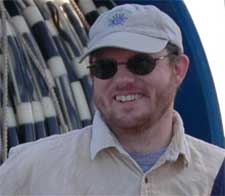 KINGSTON, R.I.–November 18, 2011–Shortly after disembarking from a research ship in Italy last month, University of Rhode Island’s alumnus Jeffrey Book, a civilian physical oceanographer at the Naval Research Lab (NRL) at Stennis Space Center, Miss., flew to Washington, D.C. where he was awarded a Presidential Early Career Award. The award is the highest honor bestowed by the U.S. government on scientists and engineering professionals in the early stages of their research careers.
KINGSTON, R.I.–November 18, 2011–Shortly after disembarking from a research ship in Italy last month, University of Rhode Island’s alumnus Jeffrey Book, a civilian physical oceanographer at the Naval Research Lab (NRL) at Stennis Space Center, Miss., flew to Washington, D.C. where he was awarded a Presidential Early Career Award. The award is the highest honor bestowed by the U.S. government on scientists and engineering professionals in the early stages of their research careers.
Jeff’s journey to the White House began in a small town near Cincinnati, Ohio where, as a young boy, he often pretended to be Jacques Cousteau-like, researching undersea biology in his backyard. The path veered to physics studies at the University of Missouri-Rolla. After graduation, he applied to several graduate schools, including our Graduate School of Oceanography. The GSO and oceanography were not his first choices, but all that changed when he visited the campus. You could say it was love at first sight—with the school and later that summer with URI 1996 alumna Majorie Kelner, his future wife.
Jeff earned his master’s degree in 1998 and his doctorate in 2007 from URI’s Graduate School of Oceanography. Oceanographer Mark Wimbush was Jeff’s advisor for his master’s thesis and his Ph.D. dissertation. “Mark’s teaching and mentorship has played a huge role in my “early career” and I try my best to model his dedication to learning, teaching, and excellence in science. My training at GSO influences nearly all of my work, especially the emphasis on understanding ocean dynamics through observation,” says the award winner.
Starting full time at the NRL in 1999, one of Jeff’s first assignments was a continuation of his collaboration with Wimbush and the GSO’s Randy Watts in the Sea of Japan.
His work as principal investigator for the Navy lab project, Dynamics of the Adriatic in Real Time, with the NATO Undersea Research Centre and 23 other institutions, has led to an improved understanding of how waters of different characteristics interact when they meet at ocean boundaries and form complex flow structures that can affect activities taking place in the sea. Those observations can be used to evaluate our ability to predict the ocean in the short term with numerical models.
Jeff contributed to the development and use of new technologies to measure ocean structures and provide the data in real-time so it can be immediately used by prediction models to make more accurate forecasts of ocean conditions.
Jeff is continuing such work off the North West Shelf of Australia, studying the effect of strong tides on ocean predictability, but early in 2012 he will shift gears a bit for a case study on ocean fine structure off South Africa. “My recent work on the Agulhus Return Current has brought me full circle to my URI masters thesis work on the Kuroshio current as once again I am working on Western Boundary Current Dynamics,” the oceanographer says.
Photo courtesy of Naval Research Lab (NRL) at Stennis Space Center

